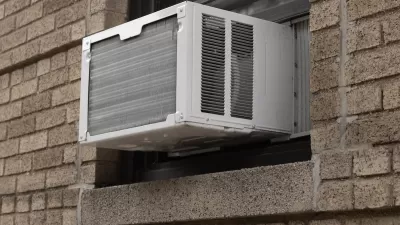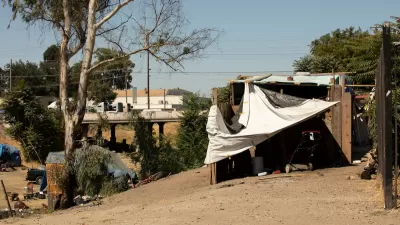New York City saw its deadliest year for people living in shelters or public spaces, with the pandemic and a rise in deadly overdoses fueling a fatal epidemic.

"Last year, 640 unhoused people died in shelters, hospitals or the streets, 4 percent higher than in 2020, when COVID-19 first struck New York City," reports David Brand, despite the city's shelter population being at its lowest level in 10 years.
"A rise in drug overdoses fueled the lethal increase and accounted for at least 237 deaths between July 1, 2020 and June 30, 2021, up from 131 the previous year, according to an annual report compiled by the city’s health and social services agencies." The report notes that "DHS staff administered naloxone 1,107 times last calendar year and reversed 928 overdoses."
According to a DHS statement, "Our annual report continues to reflect the numerous challenges the unprecedented COVID-19 pandemic presented across the DSS-DHS system, which, in addition to its impact on the physical health of our clients, also exacerbated the ongoing challenges related to mental health and substance use that New Yorkers experiencing homelessness—and our nation writ-large—are increasingly encountering."
Poverty, and homelessness in particular, are determinants of poor health outcomes the report notes. People who experience homelessness have a greater incidence of chronic illness, a lower rate of preventive health treatment, a higher risk of violence and a decreased life expectancy than the general population, the report continues.
Advocates call the deaths preventable, saying the city must bolster its social safety net and increase access to affordable housing. Mayor Eric Adams has received criticism for his "Subway Safety" plan, which removes unhoused people from the city's subway but has not, so far, supplemented enforcement with social services. "Between Feb. 21 and 27, police ejected 455 people from trains and arrested 143 others, but outreach workers only managed to place 22 people into shelters, the Mayor’s Office said."
FULL STORY: 2021 Was Deadliest Year on Record for Homeless New Yorkers

Planetizen Federal Action Tracker
A weekly monitor of how Trump’s orders and actions are impacting planners and planning in America.

Restaurant Patios Were a Pandemic Win — Why Were They so Hard to Keep?
Social distancing requirements and changes in travel patterns prompted cities to pilot new uses for street and sidewalk space. Then it got complicated.

Maui's Vacation Rental Debate Turns Ugly
Verbal attacks, misinformation campaigns and fistfights plague a high-stakes debate to convert thousands of vacation rentals into long-term housing.

In California Battle of Housing vs. Environment, Housing Just Won
A new state law significantly limits the power of CEQA, an environmental review law that served as a powerful tool for blocking new development.

Boulder Eliminates Parking Minimums Citywide
Officials estimate the cost of building a single underground parking space at up to $100,000.

Orange County, Florida Adopts Largest US “Sprawl Repair” Code
The ‘Orange Code’ seeks to rectify decades of sprawl-inducing, car-oriented development.
Urban Design for Planners 1: Software Tools
This six-course series explores essential urban design concepts using open source software and equips planners with the tools they need to participate fully in the urban design process.
Planning for Universal Design
Learn the tools for implementing Universal Design in planning regulations.
Heyer Gruel & Associates PA
JM Goldson LLC
Custer County Colorado
City of Camden Redevelopment Agency
City of Astoria
Transportation Research & Education Center (TREC) at Portland State University
Jefferson Parish Government
Camden Redevelopment Agency
City of Claremont





























